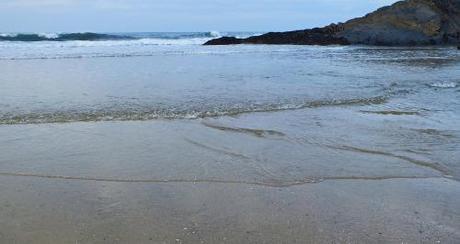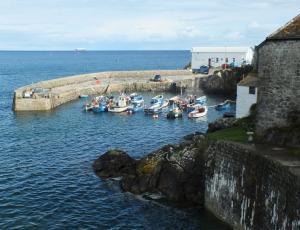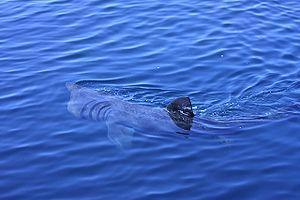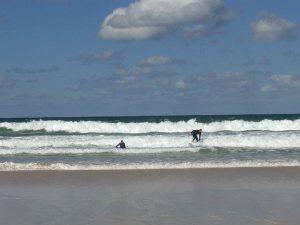In my last post, I talked about the two species of seahorses – Short-snouted and Spiny seahorses – we can find around our shores, including here in Cornwall. This cryptic creature is hard to find, but I like to think of it, nestling among the seagrass and seaweed in its salty water world, safe from human disturbance in a world set apart from the hustle and bustle of life on land.

Polly Joke beach (photo credit: Amanda Scott)
If only that were true. The reach of us humans has extended everywhere across this globe, from the upper levels of the atmosphere to the bottom of the oceans in far-flung places. So, it has certainly reached our local seas. Seahorses, as fish highly sensitive to environmental disturbance and change, are a good ‘barometer’ of wider adverse impacts. Dredging and anchorages, when not managed sensitively, can destroy the seagrass beds and other habitats they rely on; and, like many mobile sea creatures, and in the same way as we are seeing on the crowded land, they suffer from a loss of connectivity between habitats and breeding sites.

Coverack harbor (photo credit: Amanda Scott)
Cornwall is a maritime county. Cornish people work on the sea, enjoy surfing on it, walking along the strand or cliffs, swimming in the water (in summer!), spotting basking sharks and dolphins, rockpooling, and much much more. We need to protect our seas – they are part of our heritage, livelihoods and culture – but it’s not all serious: there are plenty of things that are fun to get involved with, but which also help in preserving our shores and seas. Here are a few to think about.
1. Cornwall Wildlife Trust organises lots of different activities under its Living Seas banner: click here to link to their site for more information. You can, for example (and these are just a taster):
- Become a ‘Your Shore‘ volunteer – working with a great bunch of people in partnership with CWT and your local VMCA (Voluntary Marine Conservation Area)

Basking Shark (Photo credit: Wikipedia)
- Get trained and help in recording marine sightings, and get involved in some fun events with Seaquest SouthWest. (I’m hoping to spot my first basking shark this year!)
- If you’re a recreational diver, trained to a level of BSAC Sports Diver or PADI Rescue Diver, then you could get involved in Seasearch, and help in marine surveys.
- Go rock pooling! CWT are organising a half-term rockpool ramble at West Looe on 16 February at 2pm. Check out their other events for some great and informative days out.
2. You could join The Seahorse Trust. You can adopt a seahorse though the Trust, as well. Have a look at their great website for lots of information about seahorses and the threats they are facing. It is both packed with facts and links to survey and scientific work as well as great photos.
3. Are you a surfer? Surfers Against Sewage is a national charity, but it started its life in Cornwall with a group of surfers and beach-lovers in St. Agnes and Porthtowan. They have plenty of ways to get involved: check out their Facebook page.

Surfing at St Ives (photo credit: Amanda Scott)
4. Other local organisations, such as the RSPB and National Trust will have marine-related volunteering opportunities. You could become a Hayle Estuary Litter Picker with the RSPB – it may not sound immediately inviting! – but done in a crowd it can be great fun meeting like-minded people and doing your bit to keep beaches clean for wildlife and us to enjoy.
5. You could resolve to learn about a particular marine species, or group of species. I really enjoyed learning more about seahorses – basking sharks are next on my list! Then join or help out an organisation that campaigns for them, such as The Seahorse Trust, or Marine Conservation Society.
6. Make sure you only eat responsibly and sustainably sourced fish – this supports local fishing businesses, as well as being ethical and tastier.
7. Respond to the DEFRA consultation on Marine Conservation Zones (check out my post from a few weeks ago – and here’s the link again). There are lots of different people and interests involved, and it is very important the outcome is sustainable for the local economy as well as wildlife, so the solutions are not straightforward. Many nature organisations are however disappointed with the Government’s position and, whatever your views, the consultation is a good opportunity to make them known. Or write to your MP.
Well, that’s a few ideas, and there will be lots I have missed out. If you have any ideas you’d like to share, please leave a comment here or on the What’s Wild in Cornwall Facebook page, and spread the word!


